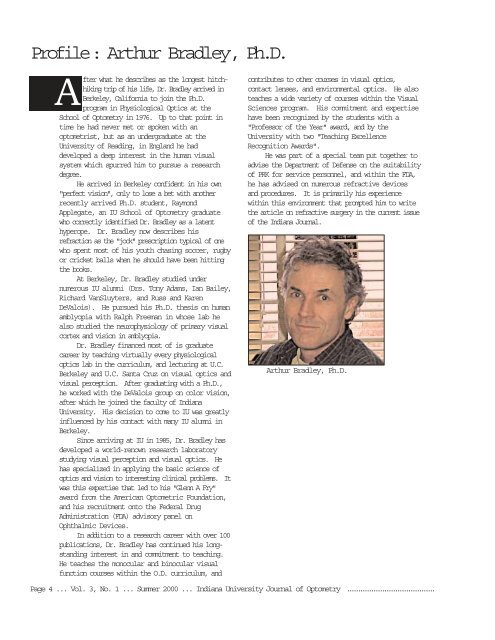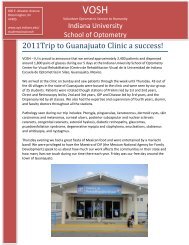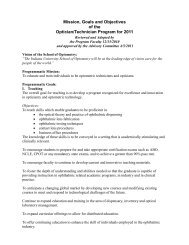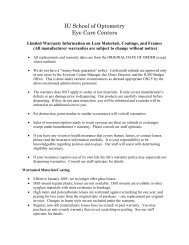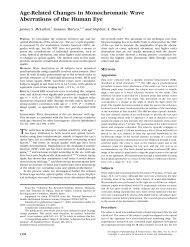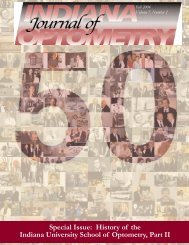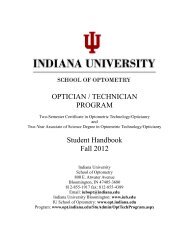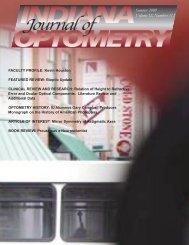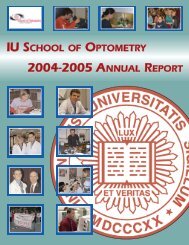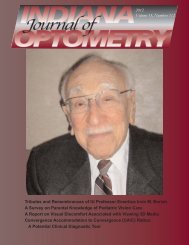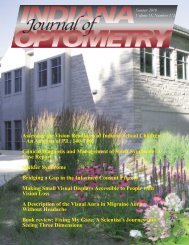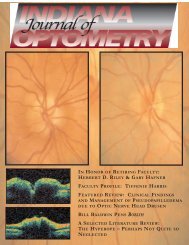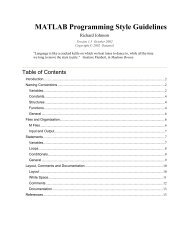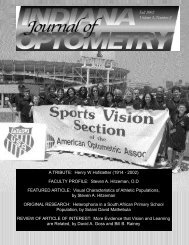Summer 2000 - Indiana University School of Optometry
Summer 2000 - Indiana University School of Optometry
Summer 2000 - Indiana University School of Optometry
You also want an ePaper? Increase the reach of your titles
YUMPU automatically turns print PDFs into web optimized ePapers that Google loves.
Pr<strong>of</strong>ile: Arthur Bradley, Ph.D.<br />
After what he describes as the longest hitchhiking<br />
trip <strong>of</strong> his life, Dr. Bradley arrived in<br />
Berkeley, California to join the Ph.D.<br />
program in Physiological Optics at the<br />
<strong>School</strong> <strong>of</strong> <strong>Optometry</strong> in 1976. Up to that point in<br />
time he had never met or spoken with an<br />
optometrist, but as an undergraduate at the<br />
<strong>University</strong> <strong>of</strong> Reading, in England he had<br />
developed a deep interest in the human visual<br />
system which spurred him to pursue a research<br />
degree.<br />
He arrived in Berkeley confident in his own<br />
"perfect vision", only to lose a bet with another<br />
recently arrived Ph.D. student, Raymond<br />
Applegate, an IU <strong>School</strong> <strong>of</strong> <strong>Optometry</strong> graduate<br />
who correctly identified Dr. Bradley as a latent<br />
hyperope. Dr. Bradley now describes his<br />
refraction as the "jock" prescription typical <strong>of</strong> one<br />
who spent most <strong>of</strong> his youth chasing soccer, rugby<br />
or cricket balls when he should have been hitting<br />
the books.<br />
At Berkeley, Dr. Bradley studied under<br />
numerous IU alumni (Drs. Tony Adams, Ian Bailey,<br />
Richard VanSluyters, and Russ and Karen<br />
DeValois). He pursued his Ph.D. thesis on human<br />
amblyopia with Ralph Freeman in whose lab he<br />
also studied the neurophysiology <strong>of</strong> primary visual<br />
cortex and vision in amblyopia.<br />
Dr. Bradley financed most <strong>of</strong> is graduate<br />
career by teaching virtually every physiological<br />
optics lab in the curriculum, and lecturing at U.C.<br />
Berkeley and U.C. Santa Cruz on visual optics and<br />
visual perception. After graduating with a Ph.D.,<br />
he worked with the DeValois group on color vision,<br />
after which he joined the faculty <strong>of</strong> <strong>Indiana</strong><br />
<strong>University</strong>. His decision to come to IU was greatly<br />
influenced by his contact with many IU alumni in<br />
Berkeley.<br />
Since arriving at IU in 1985, Dr. Bradley has<br />
developed a world-renown research laboratory<br />
studying visual perception and visual optics. He<br />
has specialized in applying the basic science <strong>of</strong><br />
optics and vision to interesting clinical problems. It<br />
was this expertise that led to his "Glenn A Fry"<br />
award from the American Optometric Foundation,<br />
and his recruitment onto the Federal Drug<br />
Administration (FDA) advisory panel on<br />
Ophthalmic Devices.<br />
In addition to a research career with over 100<br />
publications, Dr. Bradley has continued his longstanding<br />
interest in and commitment to teaching.<br />
He teaches the monocular and binocular visual<br />
function courses within the O.D. curriculum, and<br />
contributes to other courses in visual optics,<br />
contact lenses, and environmental optics. He also<br />
teaches a wide variety <strong>of</strong> courses within the Visual<br />
Sciences program. His commitment and expertise<br />
have been recognized by the students with a<br />
"Pr<strong>of</strong>essor <strong>of</strong> the Year" award, and by the<br />
<strong>University</strong> with two "Teaching Excellence<br />
Recognition Awards".<br />
He was part <strong>of</strong> a special team put together to<br />
advise the Department <strong>of</strong> Defense on the suitability<br />
<strong>of</strong> PRK for service personnel, and within the FDA,<br />
he has advised on numerous refractive devices<br />
and procedures. It is primarily his experience<br />
within this environment that prompted him to write<br />
the article on refractive surgery in the current issue<br />
<strong>of</strong> the <strong>Indiana</strong> Journal.<br />
Arthur Bradley, Ph.D.<br />
Page 4 ... Vol. 3, No. 1 ... <strong>Summer</strong> <strong>2000</strong> ... <strong>Indiana</strong> <strong>University</strong> Journal <strong>of</strong> <strong>Optometry</strong> ........................................


